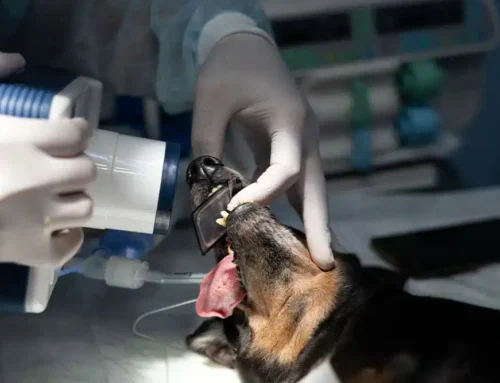As spring arrives in Reno, you may notice your pet scratching more, sneezing, or developing red, irritated skin. These signs—though easy to dismiss at first—often point to a common but uncomfortable issue: seasonal allergies.
At Peak Pet Urgent Care, we’re here to help you understand what’s happening, why it matters, and how we can work together to keep your pet comfortable year-round.
What Are Seasonal Allergies in Pets?
Seasonal allergies, also called atopic dermatitis, occur when a pet’s immune system overreacts to environmental triggers—like pollen, mold spores, and grasses. These allergens peak at specific times of year, unlike food allergies or dust mite sensitivities, which persist year-round.
Some pets show signs as early as 1–3 years old, but allergies can emerge at any age.
Want to learn more about the different types of dog allergies? Check out: Dog Allergies: Symptoms & Treatment – AKC
Why Some Pets Are More Prone
Certain breeds, including Bulldogs, German Shepherds, and Boxers, have a genetic predisposition to allergies. Other contributing factors include:
- High local pollen counts
- Indoor mold or dust exposure
- Flea bites, which can trigger severe allergic reactions
A compromised immune system may also make some pets more reactive over time.
Why It Matters: More Than Just Itching
Seasonal allergies aren’t just inconvenient—they can seriously impact your pet’s quality of life. If left untreated, symptoms may lead to:
- Secondary infections from open wounds or hot spots
- Chronic skin thickening or discoloration
- Persistent ear infections
- Anxiety, restlessness, and sleep disruption
Early diagnosis and treatment help prevent complications—and give your pet real relief.
Recognizing the Signs of Seasonal Allergies
Symptoms can range from mild to severe. Common signs include:
Skin and Coat
- Persistent scratching or chewing, especially on paws, ears, and face
- Red, inflamed skin or hot spots
- Hair loss or skin infections
Ears
- Head shaking, scratching, or waxy discharge
- Odor or sensitivity to touch
Learn how to keep them clean: Ear Cleaning Tips – Cornell University
Respiratory or Other Signs
- Sneezing, coughing, or watery eyes
- Lethargy or changes in mood
- Occasional vomiting or diarrhea
What Happens Without Treatment?
If seasonal allergies go unmanaged, they can progress into chronic issues:
- Skin thickening from constant inflammation
- Recurring infections that resist treatment
- Behavioral problems due to ongoing discomfort
Proactive management prevents these outcomes and helps maintain your pet’s physical and emotional well-being.
How We Diagnose Allergies at Peak Pet
We begin with a full physical exam, focusing on the skin, ears, and history of symptoms. Depending on findings, we may recommend:
- Skin scrapings or cytology to check for mites, bacteria, or yeast
- Intradermal or serum allergy testing to identify environmental triggers
- Fungal cultures or bloodwork to rule out other causes
This approach allows us to treat the root cause—not just the symptoms.
Treatment: Relief That’s Tailored to Your Pet
Allergy care is rarely one-size-fits-all. We build customized plans that may include:
Medications and Biologic Therapies
- Antihistamines for mild symptom relief
- Apoquel® or Cytopoint® for targeted immune control
- Short-term corticosteroids for flare-ups
Topical Therapies
- Medicated shampoos and wipes to soothe skin and reduce inflammation
Topical Therapy in Allergic Dermatitis – DVM360
Supplements and Nutrition
- Omega-3 fatty acids for skin barrier support
- Probiotics to balance gut and immune health
- Prescription diets for skin sensitivity
Nutrition’s Role in Itchy Pets – OVC Pet Nutrition
Integrative Support
We may discuss adjunct therapies such as acupuncture—always under veterinary supervision.
Daily Life and Prevention Tips
Managing allergies often requires some day-to-day adjustments:
- Keep pets indoors during high pollen hours
- Wipe paws and coats after outdoor exposure
- Wash bedding regularly
- Use HEPA air filters to reduce allergens
- Maintain year-round flea prevention
Simple steps at home can make a big difference in your pet’s comfort.
What to Bring to Your Allergy Appointment
To get the most from your visit, bring:
- A symptom log (dates, duration, triggers)
- Photos or videos of flare-ups
- A list of current medications, supplements, and diet
- Any previous test results, if applicable
Questions to consider:
- What allergens are likely affecting my pet here in Reno?
- Should we start with testing or treatment?
- What are the risks of long-term medication use?
- How often should follow-ups occur?

FAQs: Your Top Allergy Questions, Answered
Can pets outgrow allergies?
Not typically—seasonal allergies are usually lifelong but manageable.
Is there a cure?
There’s no cure, but treatments like immunotherapy can reduce symptoms over time.
Are there natural remedies?
Omega-3s, baths, and environmental control help—but always talk to your vet first.
How long until my pet feels better?
Some treatments work within days; others, like immunotherapy, may take months.
Can allergies affect behavior?
Yes. Chronic discomfort can cause irritability, anxiety, and sleep disturbances.
Your Partner in Pet Wellness—All Season Long
At Peak Pet Urgent Care, we know how stressful it can be to watch your pet struggle with allergies. Our team is here to offer expert care, clear answers, and a customized plan to help your pet feel better—without the guesswork.
Contact us to take the first step toward long-term relief.






Leave A Comment